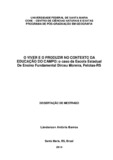| dc.creator | Barros, Lânderson Antória | |
| dc.date.accessioned | 2015-05-18 | |
| dc.date.available | 2015-05-18 | |
| dc.date.issued | 2014-11-24 | |
| dc.identifier.citation | BARROS, Lânderson Antória. The LIVE AND PRODUCE IN THE CONTEXT OF THE FIELD OF EDUCATION: the case of State Teaching Elementary School Dirceu Moreira, Pelotas. 2014. 105 f. Dissertação (Mestrado em Geociências) - Universidade Federal de Santa Maria, Santa Maria, 2014. | por |
| dc.identifier.uri | http://repositorio.ufsm.br/handle/1/9429 | |
| dc.description.abstract | The Brazilian agrarian space, from the second half of the twentieth century, has undergone numerous transformations through agricultural modernization process and the "Green Revolution . The new goals set for the Brazilian countryside interfered directly in the social relations of the farmer, as concurrently to the modernization process, an increase in the dependence of producers in relation to external factors, and other significant economic, social, cultural and environmental impacts. From this context means be extremely important to establish a new education project in schools located in rural areas, as this has a big role in these spaces. The design built between students, children of farmers, on the agrarian space more specifically family farming can be a determining factor in keeping these subjects in the field valuing their culture, thus enabling the social reproduction of these actors, This work has the theme guiding the perspective of rural students about their place to live and produce, highlighting and understanding the importance of field school in these aspects. The object where the study was the School EPS Dirceu Moreira, located on the 6th Pelotas district known as Santa Silvana. Thus, we understand during the interviews how students perceive the appropriation of nature from their relations with the place to live and produce. We can identify several problems in school, including the school's precariousness and the lack of new development perspectives to the location. | eng |
| dc.description.sponsorship | Coordenação de Aperfeiçoamento de Pessoal de Nível Superior | |
| dc.format | application/pdf | por |
| dc.language | por | por |
| dc.publisher | Universidade Federal de Santa Maria | por |
| dc.rights | Acesso Aberto | por |
| dc.subject | Educação no campo | por |
| dc.subject | Espaço agrário | por |
| dc.subject | Jovens rurais | por |
| dc.subject | Education in rural | eng |
| dc.subject | Agricultural area | eng |
| dc.subject | Rural youth | eng |
| dc.title | O viver e o produzir no contexto da educação do campo: o caso da Escola Estadual de Ensino Fundamental Dirceu Moreira, Pelotas - RS | por |
| dc.title.alternative | The live and produce in the context of the field of education: the case of State Teaching Elementary School Dirceu Moreira, Pelotas | eng |
| dc.type | Dissertação | por |
| dc.description.resumo | O espaço agrário brasileiro, a partir da segunda metade do século XX, sofreu inúmeras transformações através do processo de modernização da agricultura e da Revolução Verde . Os novos objetivos traçados para o espaço rural brasileiro interferiram diretamente nas relações sociais do agricultor, pois concomitantemente ao processo de modernização, ocorreu um aumento na dependência dos produtores em relação a fatores externos, entre outros significativos impactos econômicos, sociais, culturais e ambientais. A partir desse contexto, entende-se ser de extrema relevância que se estabeleça um novo projeto de educação nas escolas localizadas no espaço rural, pois esta possui um grande papel nesses espaços. A concepção construída entre os estudantes, filhos de agricultores, sobre o espaço agrário mais especificadamente a agricultura familiar pode ser um fator determinante para manter estes sujeitos no campo valorizando sua cultura, possibilitando assim a reprodução social desses atores. Este trabalho tem como tema norteador a perspectiva dos estudantes rurais sobre o seu lugar de viver e produzir, destacando e compreendendo a importância da escola do campo nestes aspectos. O objeto onde o estudo foi a Escola E. E. F. Dirceu Moreira, localizada no 6º distrito de Pelotas conhecido como Santa Silvana. Dessa forma buscamos compreender ao longo das entrevistas como os estudantes percebem a apropriação da natureza a partir das suas relações com o lugar de viver e produzir. Podemos identificar diversos problemas existentes na escola, dentre eles a precarização da escola e a falta de novas perspectivas de desenvolvimento para a localidade. | por |
| dc.contributor.advisor1 | Wizniewsky, Carmen Rejane Flores | |
| dc.contributor.advisor1Lattes | http://lattes.cnpq.br/9604409518707631 | por |
| dc.contributor.referee1 | Hillig, Clayton | |
| dc.contributor.referee1Lattes | http://lattes.cnpq.br/3286366881277429 | por |
| dc.contributor.referee2 | Salamoni, Giancarla | |
| dc.contributor.referee2Lattes | http://lattes.cnpq.br/6046644589572233 | por |
| dc.creator.Lattes | http://lattes.cnpq.br/7478517467888202 | por |
| dc.publisher.country | BR | por |
| dc.publisher.department | Geografia | por |
| dc.publisher.initials | UFSM | por |
| dc.publisher.program | Programa de Pós-Graduação em Geografia | por |
| dc.subject.cnpq | CNPQ::CIENCIAS HUMANAS::GEOGRAFIA | por |


